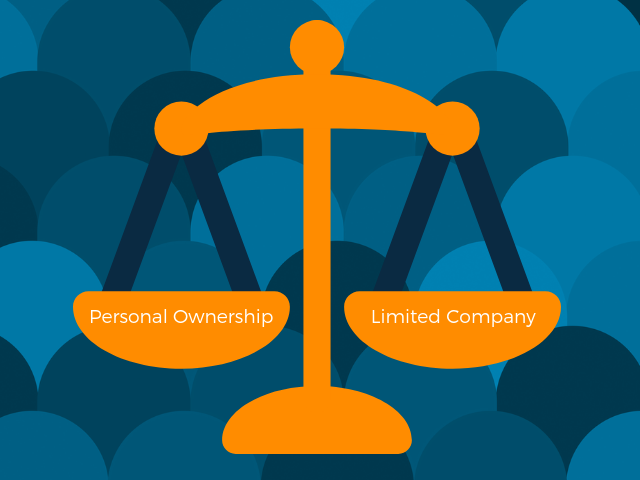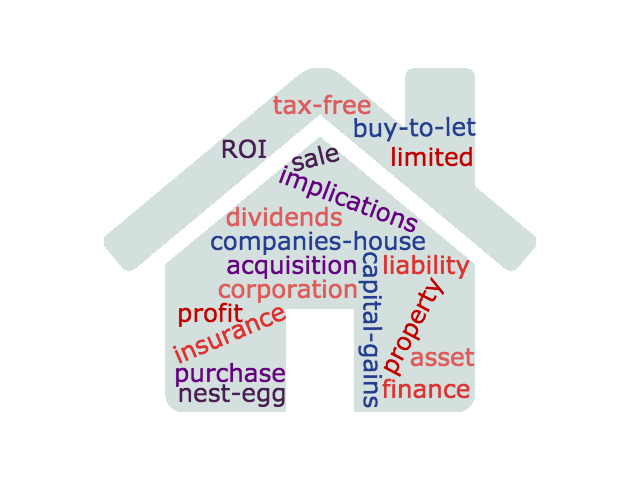Should You Buy Property Via A Limited Company?

Investment opportunities in properties look attractive in terms of higher annual return than savings accounts, and you might have considered are there any benefits if you buy property via a limited company, rather than make the investment as an individual.
What are the characteristics of a limited company?
Well you should think of a limited company as a distinct legal entity from its owners, and the owners are protected by limited liability up to the amount they have invested.
So, say you registered a company (this must be done at Companies House, the UK registrar of companies), with say 1 share, with a value of £1, to yourself as director and sole owner. Your limit of liability in this case would be £1. So, if the company went into debt by £100,000, you would only be liable for £1.
Is a limited company a good place for you to buy a property?
Any thoughts would have to be discussed with a financial specialist in this area first, but while it appears on the face of it and attractive idea, it is potentially fraught with issues, so tread carefully. Whilst every decision in terms of business can have risks, these may be outweighed by the pros to buy property via a limited company, however this is dependent on what size the business is and the amount of income that is generated overall.
By investing properties into a limited company, it means that the business will then have its own individual legal entity, this means that the business that is taken place is between your company (i.e. your properties) and the limited company, not dealt with you as an individual. This has its advantages and disadvantages but consult your accountant to decide whether this is good for you. On the other hand, before even considering investing in a limited company you might fall at the first hurdle, which is deciding on the company name and you need to make sure this is unique, uncommon and importantly doesn’t exist anywhere else. (Companies House will do this check for you). You will also have to check the trade mark registry as well, as you don’t want to end up with legal battles from day 1, just because you chose the wrong name!

How would the limited company operate?
If you have an existing limited company set-up already, you could use this to purchase the investment property. So rather than paying income tax at 40% or higher (assuming you are in this higher rate tax band) as an individual, for a small business with profits under £300,000 the corporation tax is currently 19% (from 1st April 2018). You could then pay yourself dividends from the limited company, but the days of tax free dividends has now almost long gone, e.g. from 6th April 2018 to 5th April 2019, the amount you can pay yourself tax free on dividends, has reduced down to just £2000. Then if you are a higher rate taxpayer, you would still have to pay tax on the difference at 32.5% (arguably this is still lower than 40% though)
What are the possible cons to investing via a limited company?
You might not actually have a limited company set up already? Whilst it is fairly easy to set one up, there are annual expenses you have to consider in running the company i.e. Company house registration and yearly declaration charges, production of the company accounts (ideally best done by a qualified accountant), indemnity insurance, your office time to manage and collate records for the accountant, business banking costs etc. The government provide easy and cheap ways to set up a limited company, however accountants can charge you for this action. Therefore, if you are thinking of investing property via a limited company it is worth researching with your accountant what are the overall profit gains for your company.
So really you need to set-up a new company for the specific purpose i.e. as property investment company and make it as clear and as transparent to the tax authorities what you are doing and why.
Also consider any Capital Gains tax advantages from which you might benefit as an individual are lost when you dispose of the property via a limited company. (Plus if you are not in the higher rate income tax bracket to start with, you are not going to benefit in any case.)

Does your limited company have any spare cash? Well if not, you would have to turn to a lender and borrow, and this is likely to cost more for a business than an individual, as some lenders are more cautious lending to businesses than individuals.
You also need to consider how the investment property is going to be used, e.g. if it’s a holiday let, and you decide to use it in quiet periods, this would be considered a benefit in kind, and guess what… more tax to pay! (P11D) In terms of student accommodation blocks, these are used most of the year, and with contracts that is what the students sign up for therefore that is what they will pay so it is not such an issue.
How long are you intending to keep the investment for? e.g. consider what you have to do to get the investment out of the company before the company is dissolved (which also incurs additional professional expertise and cost to do) i.e. you might have difficulty in extracting the cash in a tax efficient way.
The pros are that if you have multiple property investments, the benefits of reduced tax will compound, so if you keep the money in the company you might have the ability to properly offset expenses against revenue. So, for a long-term view, maybe involving any family members as company directors/shareholders, could be beneficial. In terms of investing property via a limited company it will increase the credibility of your properties e.g. if you are renting them out. This is due to the fact linking with a limited company people will assume immediately that your business has a commitment to certain performance and minimum standards will be met.
It can assume a brand identity and you will be able to link it to your own branded website and operate with branded email addresses. I.e.it gives the impression of a large professional organisation, which in reality might only be a single person working in a small office.
So, in summary, seek professional advice, before going down this route, but for a small investor it is unlikely to be a good decision. For a larger investor, who wants to build up a large property portfolio, investing via a limited company might be the direction you want your business to go, particularly as the company is separate legal entity and will continue when you die, and could be continued to operate by your chosen dependents or anyone you want. Therefore, by seeking advice from an accountant or financial advisor this will mean you will get the right advice to suit you in your situation. With each pro there is a con for investing in property via a limited company, therefore it depends on what direction you want your business to take.
For property investment advice contact Aspen Woolf.


